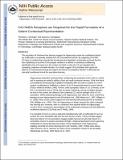CA3 NMDA Receptors are Required for the Rapid Formation of a Salient Contextual Representation
Author(s)
McHugh, Thomas J.; Tonegawa, Susumu
DownloadTonegawa_CA3 NMDA.pdf (218.1Kb)
OPEN_ACCESS_POLICY
Open Access Policy
Creative Commons Attribution-Noncommercial-Share Alike
Terms of use
Metadata
Show full item recordAbstract
The acquisition of Pavlovian fear learning engages the hippocampus when the conditioned stimuli are multimodal or temporally isolated from the unconditioned stimuli. By subjecting CA3-NR1 KO mice to conditioning protocols that incorporate time-dependent components, we found that the loss of plasticity at recurrent CA3 synapses resulted in a deficits in contextual conditioning specifically when the exposure to the context was brief or when the unconditioned stimulus was signaled with a competing, predictive unimodal stimulus. Our results suggest CA3 contributes both speed and salience to contextual processing and support the theory of competition between multimodal and unimodal conditioned stimuli for associative learning.
Date issued
2009-07Department
Massachusetts Institute of Technology. Department of Biology; Massachusetts Institute of Technology. Department of Brain and Cognitive Sciences; Picower Institute for Learning and Memory; RIKEN-MIT Center for Neural Circuit GeneticsJournal
Hippocampus
Publisher
Wiley Blackwell
Citation
McHugh, Thomas J., and Susumu Tonegawa. “CA3 NMDA Receptors Are Required for the Rapid Formation of a Salient Contextual Representation.” Hippocampus 19.12 (2009): 1153–1158.
Version: Author's final manuscript
ISSN
1050-9631
1098-1063